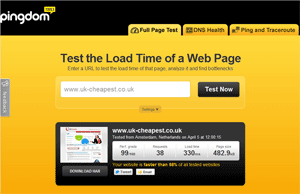 Why speeding up your web pages is more important than you think
Why speeding up your web pages is more important than you think
Even with today’s high performance web servers and mega bandwidth broadband to the home that web site page load speed is a massively important issue – yet many webmasters spend little time on the issue.
Would you be surprised to hear that 40% of users abandon a site that takes more than 3 seconds to load?
We are way past the days of modems and 128k ADSL so you would think all websites would load in an instant. Well, that is not the case. To compensate for the increase in bandwidth many webmasters have bloated their web sites with unneccessarily large images, slow plugin-ins and javascripts that simply are not used. Basically there does not seem to be a need to optimise page load time any more – or is there?
Ten years ago people expected pages to load within 30 seconds. Any slower than that and you would start losing users. Time is short and people demand more these days. Your target today has got to be 2 seconds or less.
Here’s five big reasons you need to increase your page load speed
- A one second delay can reduce conversions by 7%
- Faster web site is great for user experience
- Conversion rates and ROI will increase
- Site speed is incorporated in search rankings
- Faster pages encourages users to view more pages
- 47% of consumers expect a website to load in 2 seconds or less
- 40% abandon a website that takes more than 3 seconds to load
- 79% of shoppers are less likely to make repeat purchases from slow sites
- 52% state quick page loads are more important then site loyalty
- A 1 seconds delay decreases customer satisfaction by 16%
- 44% of shoppers will tell their friends about a bad experience
Even looking beyond the user experience you will find that page load time is also a factor for search engine rankings, conversion and perception of your brand. So for many reasons, all important reasons, you need to get your page load time in check.
How to accurately check your page load times
There are a number of tools to help you squeeze the most of your web pages. If you have never optimised your pages before then there are lots of small things you can do increase the speed – you could get 300% with little effort.
The Google Developers are always quick to release super useful tools and PageSpeed is no exception, this should be your first port of call, a simply browser plugin and you’ll get a full report on what is slowing your page speed down and tips on fixing the issues.
My favourite online page speed tester is provided by Pingdom.com, you can compare your site over time and also against other sites. You get a performance grade and a page load comparison against all other tested websites.
Our result: We get a performance grade of 99/100 and our site is faster than 98% of all tested website.
Go to Pingdom now and start to increase your page load speeds as part of your regular webmaster tasks.

